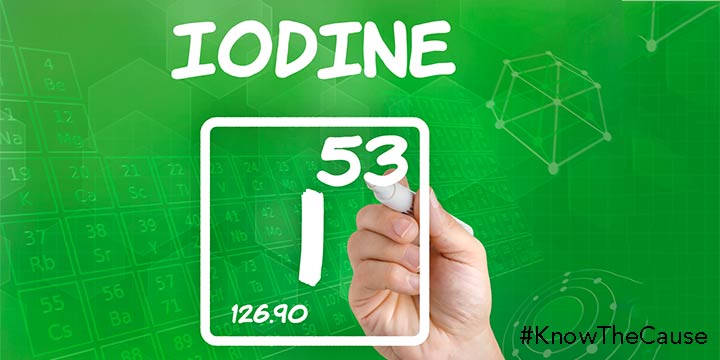

If you have ever seen a goiter, you know that getting enough iodine is important. But what exactly is iodine, and what does it do?
Iodine is a trace mineral that is vital for thyroid function. The thyroid is a gland in the neck that releases thyroid hormone, which regulates the metabolic function of cells and the growth and development of organs, specifically the brain. Without proper thyroid function, one can experience a wide array of symptoms, from depression to weight gain, fatigue, high cholesterol, and brain fog.
Needless, to say, proper thyroid function is crucial, and without iodine, there is no proper thyroid function.
Iodine is something we all should make sure that we get proper amounts of. Not only is it critical for maintaining thyroid function, getting enough iodine is associated with a number of benefits, including maintaining proper energy levels, prevention of certain types of cancer, boosted immunity, healthier skin/hair, and detoxification of chemicals from the body. Particularly during pregnancy, proper iodine levels can help ensure proper fetal development.
Many people, however, are deficient in iodine. This is despite the fact that salt is often fortified with iodine in developed countries, a process that the Swiss began in the 1920s to prevent iodine-deficiency syndromes. In developed countries, severe iodine deficiency is rare; between iodized salt and produce grown in iodine-rich soil, problems like goiters are rare. There is data that suggests, however, that much of the soil has become deficient in iodine, and that many people do not get enough of it, even in developed countries.

By making some simple dietary choices, it is possible to ensure that you get all the iodine necessary to maintain proper thyroid function and glean the benefits of this important mineral. There are a variety of Kaufmann Diet-friendly sources of iodine. These include:
Your diet can and likely should be the best source of iodine. Particularly on the Kaufmann Diet, getting enough iodine is a good way to ensure overall health, making the flourishing of an internal, pathogenic fungal infection far more difficult. While iodine, itself, does exhibit some anti-fungal activity, its utility for the Kaufmann Diet lies in promoting overall health.
Selenium is an important nutrient in relation to iodine utility; selenium assists in the recycling of iodine, and a deficiency in selenium can make the thyroid work harder. Therefore, ensuring that you get the proper amounts of iodine and selenium in your diet is crucial for ensuring you glean the benefits of iodine.
Doug Kaufmann has written many books that cover a full range or health issues. Find out which of his books best suits you by clicking the button below.
Doug Kaufmann developed his diet after years studying the clinical effects of pathogenic fungi on the body. Fungi and yeasts can become parasitic organisms on and inside our body, causing health problems that can be difficult to diagnose. Learn more about the Kaufmann Diet, change your life and know the cause.
We encourage all visitors to this site to take some time and study these technical articles prior to initiating lifestyle changes, including dietary changes and to do so with their physician’s awareness and approval. The articles posted in this link are scientific and with few exceptions are taken from medical journals familiar to healthcare workers.
Looking for help assembling antifungal Kaufmann Diet approved recipes for breakfast, lunch or dinner? We have several videos, books and recipe write ups here on Know the Cause that will help your health journey. The recipes in this section are so good, you’ll feel like you’re indulging. No sacrifice needed! Enjoy.
© 2025 Mediatriton Inc. All Rights Reserved • Website by Skynet Solutions